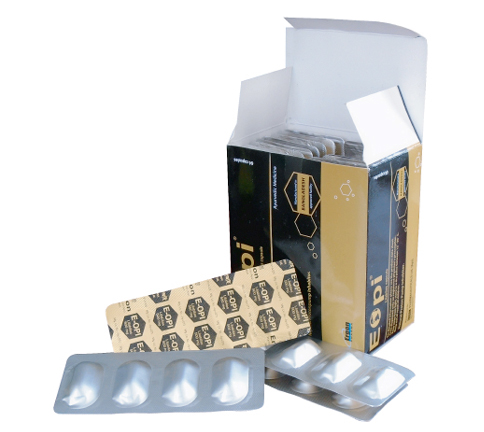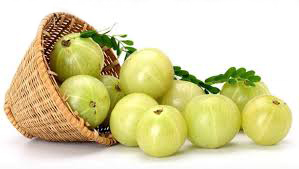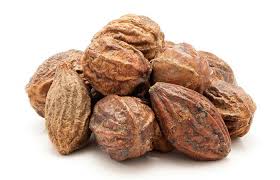
Composition :
Each Capsule contains-Indications :
EOPI capsule is indicated for gastroesophageal reflux disease including reflux esophagitts, acid reflux disease, duodenal and benign gastric ulcers, Helicobacterpylori eradication in peptic ulcer disease, prophylaxis of acid aspiration, Zollinger-Ellison Syndrome (ZES) and for the treatment of NSAID-associated gastric ulcers, duodenal ulcers or gastroduodenal erosions.
Dosage and administration :
1 Capsule Twice daily before meal or as directed by the registered physicians.
Specification :
Others information :

Benefits of Amla
Functions :
a) Amla for Digestion :
From an Ayurvedic perspective, digestion begins with the experience of taste and amla contains five of the six tastes, lacking only the salty taste. Further, amla sharpens the sense of taste itself1 and so it is both stimulating and tonifying to the first stage of digestion. Amla also improves appetite and kindles agni (the digestive fire), which are both at the core of healthy digestion. Despite the fact that its predominant taste is sour, amla stokes the digestive fire without aggravating pitta.1 And, amla cleanses and protects the liver, which plays a critical role in transforming food into physiologically useful nourishment.1 Because pitta and agni are so intimately connected, the health of the digestive fire suffers when pitta is aggravated. Amla is particularly suited to clearing excess pitta from the digestive tract; its bitter taste and cooling energy help to flush excess heat out through the bowel.1 Amla can be especially supportive to digestion during the summer months when heat tends to accumulate in the body, particularly for those with pitta-predominant constitutions.1b) Amla for Detoxification and Healthy Elimination :
Amla very directly promotes detoxification with its rich antioxidant content.1 On a systemic level, detoxification begins with healthy agni (digestive fire), not only in the GI tract, but also in all of the tissues, and amla helps to balance agni throughout the body.1 Moreover, the elimination of toxins relies on healthy circulation, digestion, and elimination, and amla supports all three of these functions.1 Amla also has a particular affinity for the blood, the liver, and the spleen, and is therefore able to support the elimination of natural toxins while nourishing and protecting the body’s natural defense systems.1 Proper elimination is critically important to the detoxification process and amla fosters bowel health and regularity as well.1 A small dose of amla is binding and astringent in its effect while a larger dose very gently encourages elimination.1 Ultimately, amla supports virtually every stage of the detoxification process—from the innate intelligence of agni to the proper elimination of wastes and natural toxins.c) Amla for Healthy Blood Sugar Levels :
Amla’s ability to stimulate microcirculation and to build ojas are thought to help promote healthy blood sugar levels, particularly in conjunction with pitta imbalances.1 Amla also has an affinity for the urinary tract and balanced excretion of urine and balanced blood sugar levels go hand in hand.2 On a large scale, Amla’s support of the entire digestive process supports the body’s ability to process food in a wholesome and efficient manner.d) Amla for Rejuvenation :
Amla is a highly revered rasayana (rejuvenative) for the entire system. Specifically, it promotes youthfulness, bolsters immunity, tonifies all the body’s tissues and promotes overall health and well-being.1 It is a brain tonic, it promotes memory, and its sattvic nature fosters subtle awareness, balanced emotions, and clarity of mind.
Benefits of Haritaki
1. Improved Digestion and Better Gastrointestinal Health:
Regularly taking the herb Haritaki can enhance the function of your digestive tract, support a healthy intestinal environment and increase the absorption of nutrients from the food you eat. At the same time, Terminalia Chebula powder is a mild laxative, improving elimination, tonifying the colon, clearing away compacted waste and helping to prevent constipation. This study showed it has a ‘significant intestinal motility-enhancing effect’ and can be a very useful aid in keeping bowel movements regular. While there may be an initial increase in flatulence and other gastrointestinal issues when you first start taking powdered Haritaki, most people quickly notice more regular bowel movements and less bloating and gas when using this widely regarded Ayurvedic treatment.2. Decreases Stomach Acidity and Guards against Ulcers:
In a related benefit, Haritaki churna can reduce excessive stomach acidity and even help prevent painful peptic and gastric ulcers by elevating protective mucus production in the stomach. The Chebulic Myrobalan fruit is rich in antioxidant polyphenols like gallic acid and ellagic acid that have been shown in studies to combat the helicobacter pylori bacteria and reduce your risk of developing stomach ulcers.3. Natural Weight Loss and Detoxification:
By improving digestive health, increasing nutrient absorption, cleaning the colon, preventing constipation and speeding up elimination time, Haritaki helps alleviate the toxic burden on your liver – a common cause of difficulty losing weight. Improved digestion and nutritional uptake will also often have a positive effect on reducing hunger and cravings for unhealthy foods, important factors that drive weight gain and lead to a more sedentary lifestyle. Triphala, with its Amalaki and Bibhitaki, combined with Haritaki can be even more effective at the herbal method for losing weight as explained here. An in yet another health benefit, likely related to improved gastrointestinal health and better absorption of vitamins, minerals and antioxidants, Terminalia Chebula fruit is considered a premier detoxifier and blood builder in Ayurveda. It is said to help elevate oxygen levels in the blood and is often recommended for low energy and lethargy. Whilst this is hard to confirm with research, many people who use Haritaki capsules like these regularly report an energizing effect when they take it.4. Antioxidant and Antibacterial Protection:
Powdered Haritaki is a rich source of potent antioxidants like ellagic acid, gallic acid, chebulic acid, flavonol glycosides, selenium and vitamin C that protect your body from cancer and other serious diseases. This research found an extract of Terminalia Chebula improved concentrations of glutathione, superoxide dismutase and other antioxidants in the liver and kidneys. The authors concluded Chebulic Myrobalan helps fight oxidative stress and may protect against age-related diseases. Dried Haritaki fruit also has strong antibacterial and antiviral properties for preventing infection from bacteria in the food you eat and from airborne viruses. As an antifungal and overall digestive health tonic it may also help treat Candida and other fungal infections throughout the body.5. Diabetes and Metabolic Syndrome:
High blood glucose levels and a decrease in insulin sensitivity due to poor diet are the primary cause of type II diabetes and its precursor metabolic syndrome. Compounds in Chebulic Myrobalan have been found to lower blood sugar levels and increase insulin sensitivity. This study showed an extract of Haritaki fruit exerted a dose-dependent yet significant glucose lowering effect on the blood. Given this, diabetic patients on blood sugar lowering medication should discuss taking Terminalia powder with their doctor before using it regularly.6. Mouth Ulcers and Lung Disorders:
Haritaki fruit or powder is often used for mouth ulcers, oral sores and gum disease. Traditionally in India, Haritaki mouthwash is made by crushing several dried fruit and boiling them in water. Once cooled, it is swirled around the mouth several times a day to quickly alleviate ulcers. It is also believed to help prevent dental decay if used regularly. The powdered herb mixed with boiling water and cooled should be effective in the same way. Haritaki churna is also recommended for bad coughs, bronchitis and other lung complaints. For this purpose around half a teaspoon of the powder is mixed with a small amount of honey with a spoon and slowly sucked upon. It can be particularly good to make up and use this natural treatment right before bed if excessive coughing is preventing you from getting to sleep.7. Better Skin and Hair:
Haritaki fruit powder is often recommended for both skin problems, like acne and skin rashes, as well as hair loss and dandruff. For acne and skin irritations a paste is made from the powdered herb in very hot water and applied directly to the affected area once it cools. Topical Haritaki treatments can speed up skin healing and help prevent further acne outbreaks. To apply to the hair, Terminalia Chebula is usually prepared in a hair oil. This recipe for Amla hair oil could also be used with the same amount of powdered Haritaki instead and applied as directed to combat hair loss and prevent dandruff. Just taking Chebulic Myrobalan powder regularly should improve both your hair and skin tone overall as it is such a rich source of antioxidants and a potent detoxifier as well.REFERENCE-
1) Pole, Sebastian. Ayurvedic Medicine: The Principles of Traditional Practice. Churchill Livingston Elsevier, 2006. 52, 126-127, 296, 303-304, 326.
2) Gogte, Vaidya V. M. Ayurvedic Pharmacology & Therapeutic Uses of Medicinal Plants. Reprint. Chaukhambha Publications, 2009. 310.
3) “Amalaki (Phyllanthus emblica).” Natural Standard: Professional Monograph. Online. 26 Feb. 2012. http://naturalstandard.com/databases/herbssupplements/amalaki.asp
4) Manjunatha, S., et al. “Effect of Chyawanprash and Vitamin C on Glucose Tolerance and Lipoprotein Profile.” Indian Journal of Physiology and Pharmacology. 45.1 (2001): 71-79. Online. PubMed. 26 Feb. 2012. http://www.ncbi.nlm.nih.gov/pubmed/11211574?dopt=Abstract
5) Jacob, A., et al. “Effect of the Indian Gooseberry (Amla) on Serum Cholesterol Levels in Men Aged 35-55 Years.” European Journal of Clinical Nutrition. 42.11 (1988): 939-944. Online. PubMed. 26 Feb. 2012. http://www.ncbi.nlm.nih.gov/pubmed/3250870?dopt=Abstract
6) Ganju, L., et al. “Immunomodulatory Effects of Agents of Plant Origin.” Biomedicine & Pharmacotherapy. 57.7 (2003): 296-300. Online. PubMed. 26 Feb. 2012. http://www.ncbi.nlm.nih.gov/pubmed/14499177?dopt=Abstract
7) Sandhya, T. and K.P. Mishra. “Cytotoxic Response of Breast Cancer Cell Lines, MCF 7 and T 47 D to Triphala and Its Modification by Antioxidants.” Cancer Letters. 238.2 (2006): 304-313. Online. PubMed. 26 Feb. 2012. http://www.ncbi.nlm.nih.gov/pubmed/16135398?dopt=Abstract

